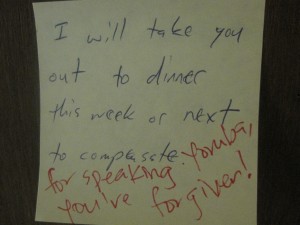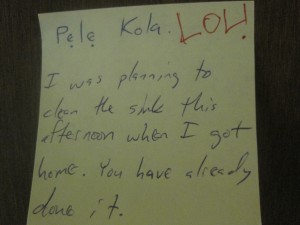I got home from school yesterday to find these post-it notes on my door. Ben had left them there.
I wrote my reply in red, and left the sheets on the door so that he can see it whenever he comes back. When I see him, I intend to inform him of how impressed I am at his resourcefulness since, as I know for a fact, I wasn’t the one who taught him pele (the Yoruba word for “I’m sorry/forgive me” ) and there is no other Yoruba person living in this building, or within a mile of our residence.


1
Clarissa at http://clarissasbox.blogspot.com
Ben is my student. 🙂 What a coincidence, huh? 🙂
Posted at March 4, 2010 on 8:10am.
2
Kola Tubosun at http://www.ktravula.com
Yes indeed. Interesting co-incidence. He speaks so glowingly about your teaching style, and I am not surprised. “She’s my friend,” I’d always respond, with pride. 🙂
Posted at March 4, 2010 on 9:12am.
3
Bola at http://YourWebsite
Mhm, I thought “pele” was used to express empathy, e.g. if sombody has hurt herself. Should Ben not have used “ma binu” in this case?
Posted at March 4, 2010 on 9:00am.
4
Kola Tubosun at http://www.ktravula.com
Sure Bola, get technical. 🙂
He should indeed have used “ma binu,” but for the sake of being impressed, we can agree that he used it not as empathy but as a greeting: e.g “Pele o, Bola. Sé alaafia ni…”
Posted at March 4, 2010 on 9:14am.
5
Sula at http://YourWebsite
If there is any testimony of the power of the Fulbright program, there it is in a nutshell! Wow, it’s really impressive.
I have found out (through my couch Anthropologist ways) that most African languages have this word (Pele in Yoruba, Yako in my own language, a subset of Akan)… The word can not quite be translated accurately in any western languages (trust me, we have tried lol)…
Mine could be translated as a mixture of “I am sorry”, it is also used when you want to share the pain of someone else, so it can be used as “Condoleances” or “I share your pain”… A single word captures all those emotions and feelings (no wonder most of our languages were not written!! :))
Good stuff, mate!
p.s: I promise to do the review as soon as possible. It’s just I want it to be as eloquent as the blog itself, and I keep freezing. Lol!
Posted at March 4, 2010 on 11:07am.
6
Kola Tubosun at http://www.ktravula.com
Oh, interesting!
I didn’t know that you have a word like that in Akan group of languages as well. But let me ask, is the word used in the same form as “pele pele” as well? “Pele Pele” is used when someone stumbles, or when we just want to ask someone to slow down, relax. I ask because in Swahili, the equivalent of “pele” is “pole” and the equivalent of “pele pele” is “pole pole”. Does “yako” work in that same way? Is there anything like “yako yako”, and what would it mean?
Posted at March 4, 2010 on 11:52am.
7
Sula at http://YourWebsite
I have never heard “yako yako” used in such a manner… I think the equivalent of Pele Pele would be Ble Ble (the e is an open e and it sounds like Blair without the r )…
It translates to “calm down”, “slow down”, “simmer down” (if someone is upset)… I think that’s closest to Pele Pele..
(Wow, I love your blog!! we are discussing similarities of African languages spoken by only a handful of people… Gotta love it!)
Posted at March 4, 2010 on 1:34pm.
8
Kola Tubosun at http://www.ktravula.com
I’m guessing that “ble” is not used as one word then? Does it occur only as “ble ble” or is there a “ble” that means something? And what language is this?
Yes, I love my blog too. 🙂 Not like I have a choice though 🙂
Posted at March 4, 2010 on 7:39pm.
9
Temitayo at http://YourWebsite
LMAO 😀
Posted at March 4, 2010 on 12:58pm.